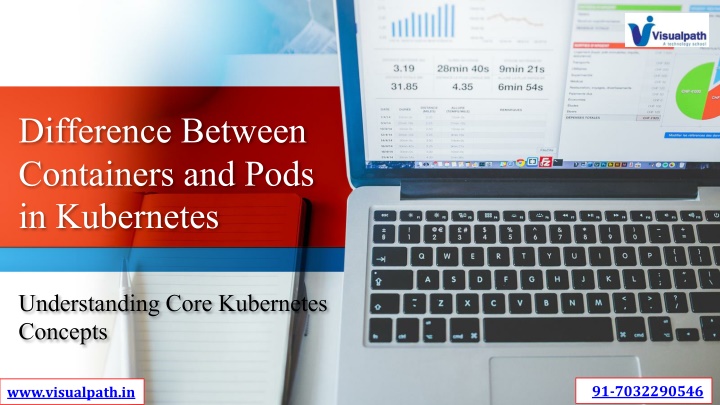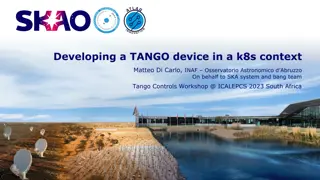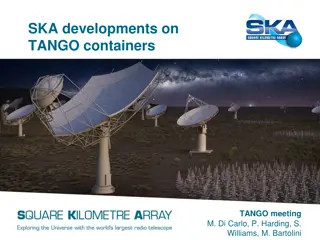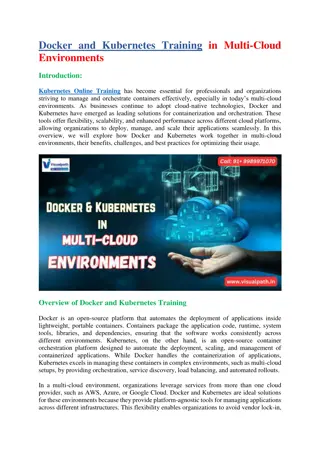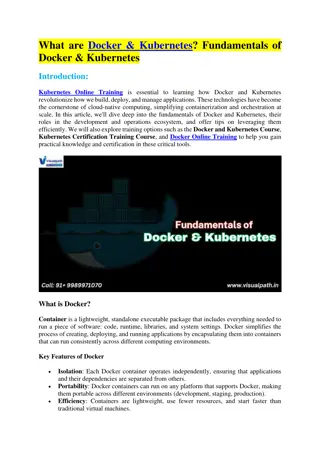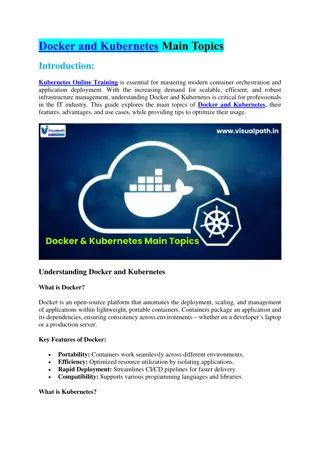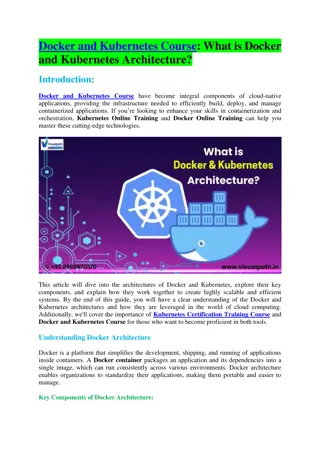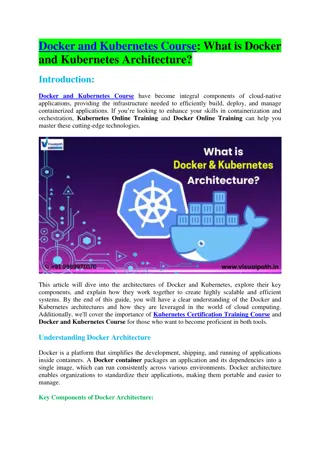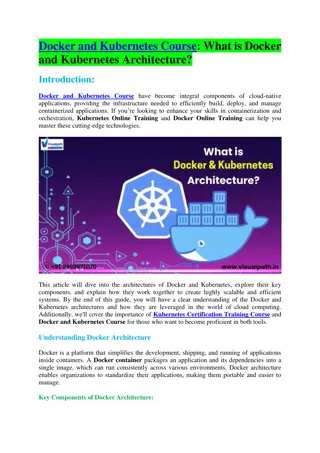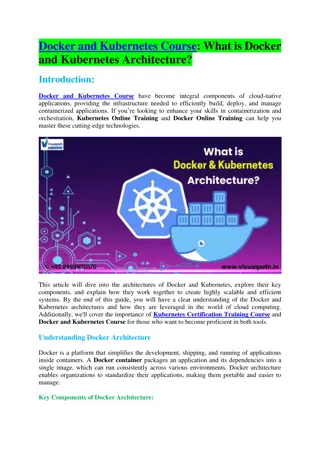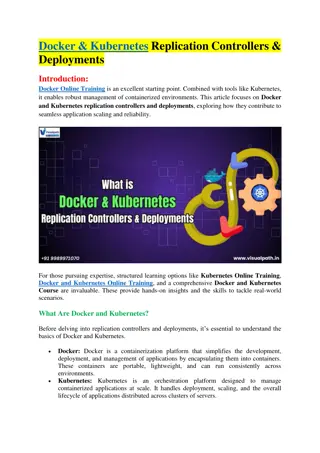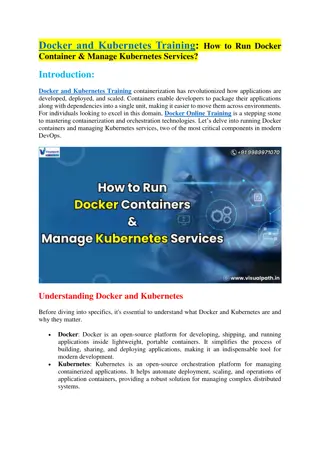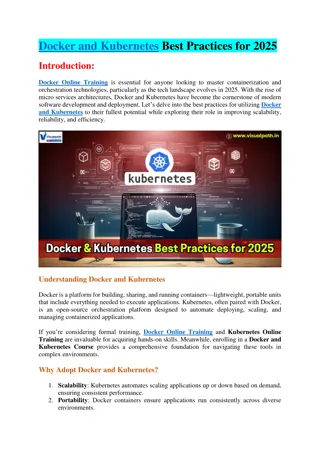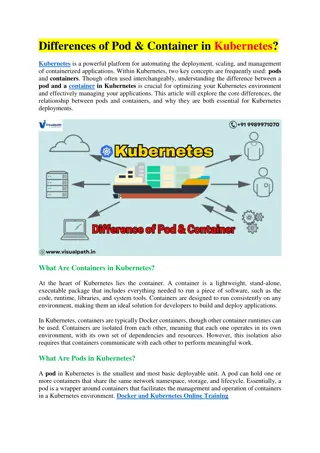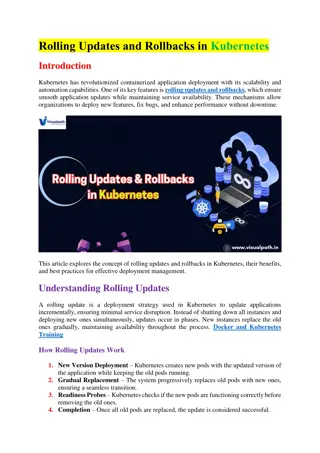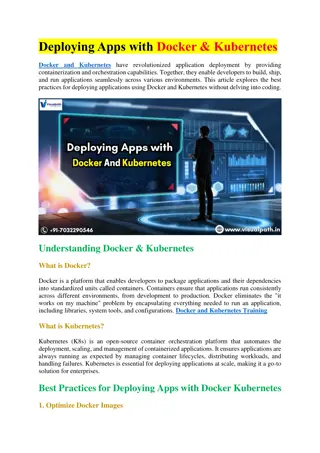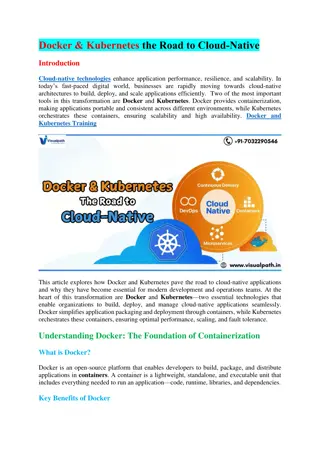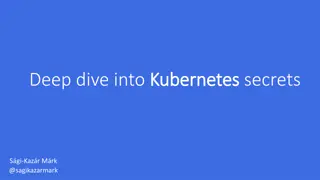Docker Online Training - Docker Kubernetes Online Courses
Visualpath offers expert-led Docker Kubernetes training with hands-on projects that are accessible globally, including in the USA, UK, Canada, Dubai, and Australia. Our Kubernetes Online Training in India covers lightweight portability, isolation, ve
Uploaded on Jun 07, 2025 | 2 Views
Download Presentation

Please find below an Image/Link to download the presentation.
The content on the website is provided AS IS for your information and personal use only. It may not be sold, licensed, or shared on other websites without obtaining consent from the author.If you encounter any issues during the download, it is possible that the publisher has removed the file from their server.
You are allowed to download the files provided on this website for personal or commercial use, subject to the condition that they are used lawfully. All files are the property of their respective owners.
The content on the website is provided AS IS for your information and personal use only. It may not be sold, licensed, or shared on other websites without obtaining consent from the author.
E N D
Presentation Transcript
Difference Between Containers and Pods in Kubernetes Understanding Core Kubernetes Concepts +91-7032290546 www.visualpath.in
Introduction to Kubernetes Kubernetes Overview: o Open-source platform for automating deployment, scaling, and managing containerized applications. o Uses containers and pods to run and manage applications. Containers: The fundamental units of deployment in Kubernetes. Pods: A higher-level abstraction that contains one or more containers. +91-7032290546 www.visualpath.in
What is a Container? Definition: A lightweight, standalone, executable package that contains everything needed to run a piece of software (code, libraries, system tools, etc.). Key Features: o Isolated environment o Portable across various environments o Can run on any platform that supports containers (Docker, container runtimes) +91-7032290546 www.visualpath.in
What is a Pod? Definition: The smallest and simplest unit in Kubernetes. A pod is a group of one or more containers that share the same network namespace and storage resources. Key Features: o Can contain multiple containers (usually tightly coupled) o All containers in a pod share the same IP address, port space, and storage o Designed for managing complex applications that need multiple containers to work together +91-7032290546 www.visualpath.in
Key Differences - Containers vs Pods Feature Container Pod Group of one or more containers with shared resources Single unit of application runtime Definition Containers inside a pod share network and storage Isolation Isolated per container Requires inter-container communication tools Containers can communicate directly (same IP) Communication Must scale containers independently Pods scale as a unit (scaling multiple containers at once) Scaling No shared resources (except host machine) Shared resources like storage volumes and network IP Resource Sharing +91-7032290546 www.visualpath.in
Pod Use Cases Multiple Containers in One Pod: o A pod may contain multiple containers that need to work closely together. o Example: A frontend and backend container sharing a volume to manage application data. Single Container Pod: A pod can also run a single container for simpler scenarios. +91-7032290546 www.visualpath.in
Scaling Containers and Pods Scaling Containers: o Independent scaling, often requiring orchestration tools (e.g., Kubernetes ReplicaSets, Docker Swarm). Scaling Pods: Kubernetes scales pods, not containers. ReplicaSets ensure the right number of pods are running. +91-7032290546 www.visualpath.in
Networking in Containers and Pods Containers: o Containers within the same host use virtual networks and can communicate via Docker bridges or Docker networking. Pods: o Pods get their own IP address. Containers within a pod share the pod's network. o Pod-to-pod communication happens over the network using unique IP addresses. +91-7032290546 www.visualpath.in
Conclusion Containers: Ideal for running a single application or service, with isolation. Pods: Essential for complex applications where multiple containers need to work together, sharing network and storage resources. Kubernetes uses pods to manage containers at scale, providing high availability and simplified networking. +91-7032290546 www.visualpath.in
For More Information About Docker and Kubernetes Address:- Flat no: 205, 2nd Floor, Nilagiri Block, Aditya Enclave, Ameerpet, Hyderabad-16 Ph. No: +91-998997107 Visit: www.visualpath.in E-Mail: online@visualpath.in +91-7032290546 www.visualpath.in
Thank You Thank You Visit: www.visualpath.in +91-7032290546 www.visualpath.in
